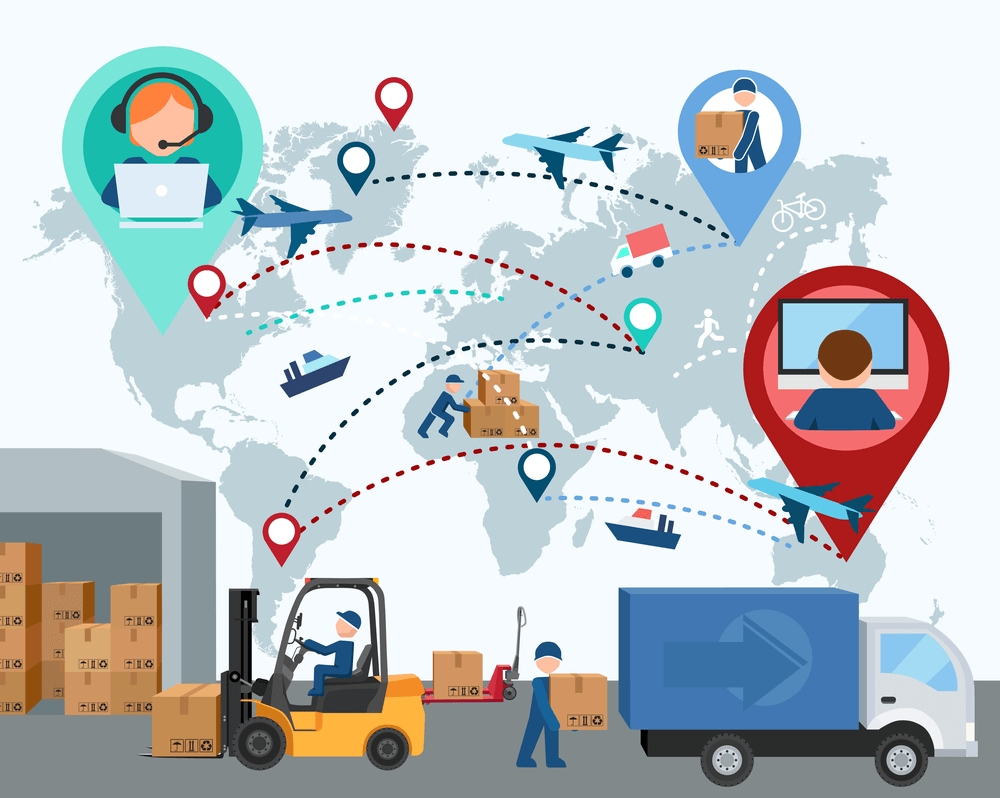
Logistics is a major contributor to the economy in Dubai, the UAE and the wider Middle East. Projections by the Dubai Media Office forecast further growth of 8.4% per annum in Dubai, reaching $31.4 billion by 2026. In Saudi Arabia, the logistics sector currently accounts for 6% of GDP but is expected to reach 10% by 2030.
Logistics is a fast-moving landscape. Staying on board with trends and taking advantage of advances in technology, automation and AI is required to stay competitive in the industry. This article looks at five key trends currently affecting every logistics company in Dubai, the UAE, and the Middle East.
1. Green Logistics
Logistics companies are responding to increasing pressure from governments, consumers and competitors to reduce their carbon footprint. According to a report by JLL, the global transportation industry is responsible for around 17% of greenhouse gas emissions at present. This means that there is significant concern about the ongoing impact of current practices.
Various governments and their departments are introducing laws, guidelines and targets related to the decrease of emissions. For example, the UAE has a net-zero emissions goal for 2050 and the Saudi Vision 2030 aims to localise manufacturing and reduce the supply chain, therefore reducing the distance traveled by products bought by Saudi customers.
Many logistics companies are reducing their emissions by investing in greener technology and transportation. This includes the electric vehicles, ships and aircraft that are increasingly being deployed around the globe. Further research and development of greener transportation options and better connectivity is ongoing, fueled by the aspirations of companies such as NAQEL Express.
2. Real-Time Data and Visibility
There is now huge consumer demand for real-time tracking of parcels. Competition between logistics companies is now shaped by who can provide the most accurate, convenient and reliable visibility data for its customers. The popularity of Amazon Prime, with its transparent parcel status offering, has made this an industry wide expectation.
NAQEL Express shipment tracking, for example, also provides a transparent global tracking mechanism to its customers available across multiple platforms. This is helping build consumer trust and confidence which, in turn, shapes corporate customer loyalty.
3. Shorter Delivery Times
Another way that global giant Amazon has influenced the industry is with super-short delivery times. In some areas, delivery times are often same-day and can be completed within a few hours. There is also high expectation for reduced delivery times on goods travelling between countries. Short delivery turnaround can only be achieved by operating a highly efficient network of warehouses that combine smaller urban warehouses with large logistics centres on excellent transportation networks.
In the MENA region in particular, integrated logistics parks are plentiful, such as the giant Jebel Ali Free Zone in Dubai and the new solar-powered logistics centre at Port Jeddah. These link the Middle East with Europe, Asia and Africa and enable the more efficient transportation of goods around the globe as well as within the MENA region.
Shorter delivery times can also be facilitated through accurate demand forecasting, which is another significant trend influencing the industry right now.
4. Demand Forecasting
Demand forecasting in the logistics industry involves informed and accurate calculation of future service demand levels and types. This is achieved through AI, which can analyse data detailing previous sales history, seasonality, market trends, the economy, and other variables to forecast the level of demand.
Demand forecasting enables logistics companies to plan ahead and better manage their resources in terms of warehousing and vehicle needs as well as human resource demand. Businesses that use demand forecasting are more likely to be able to pivot during turbulent times, as well as manage supply chain disruptions because they will have anticipated these situations. Demand forecasting is just one example of the ways in which AI has revolutionised logistics.
5. Omnichannel Customer Support
AI has also contributed to the significantly better customer experience that logistics companies now offer. Customers of NAQEL Express, for example, are able to contact them for support through multiple integrated channels such as WhatsApp, website chatbots, mobile apps, voice assistants like Amazon Alexa, and the more traditional call centre.
AI chatbots can provide immediate support to customers rather than making them wait for human assistance. They can also solve simple queries and reduce the number of people needing to speak or interact with human customer support assistance. This reduces costs as well as improves customer experience by providing faster support at more times of the day. It makes communication convenient and flexible for customers, and promotes good will.
A New World for Logistics
Embracing AI and new technologies will continue to be vital for logistic companies as they strive to be more customer-focused, planet-friendly, and efficient in a competitive market. These are exciting times in logistics in Dubai and the Middle East, with new opportunities to extend the region’s status as a global hub.